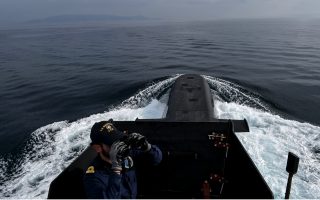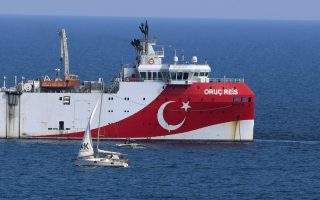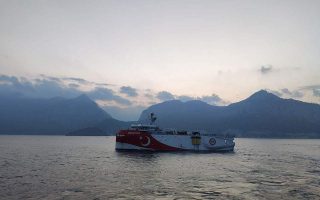Turkey’s disproportionate ambitions

The “Blue Homeland” doctrine is the ultimate expression of overblown Turkish aspirations. It encapsulates maximalist claims that are in flagrant violation of the Law of the Sea, such as the ludicrous theory that islands are not entitled to a continental shelf and, therefore, that the Greek islands east of the 25th meridian are in areas under Turkey’s maritime jurisdiction. In a similarly ludicrous manner, it disregards Cyprus’ continental shelf on the eastern borders of Turkish claims.
The memorandum between Turkey and the Sarraj government in Tripoli – an agreement that is a component of same theory – is equally arbitrary in that its delimitation of maritime zones not only entirely wipes out Crete’s continental shelf, but also draws lines to illustrate the relationship between the supposedly opposite coasts of Libya and southwestern Turkey that pass through a third country – Greece – by ignoring the existence of Kassos, Karpathos and Rhodes.
These are all unprecedented and blatant violations of every sense of the law. Indeed, no other country has recognized the agreement, not even the Libyan Parliament.
Blue Homeland is the brainchild of two radical navy admirals: the Eurasianist Cem Gurdeniz, who conceived it, and Cihat Yayci, who helped promote it. The notion driving the doctrine is that the Ottoman Empire collapsed as a result of losing its naval clout and that for Turkey to win back its deserved position, it needs to conquer the seas and acquire the capabilities of a blue-water navy.
Under normal circumstances, the extreme ideas of a few fanatics would not find purchase on the official agenda of a serious state, but there is nothing normal about Turkey right now, especially since the failed coup in 2016. Turkey today is in the grips of a nationalist paroxysm; a chimeric combination of Kemalist nationalism, Islamism and neo-Ottoman aspirations. Freedom of speech and media have in effect been abolished, as have most civil rights. Political parties are engaged in a game of nationalist one-upmanship and every opposing voice is suppressed as traitorous.
The Foreign Ministry’s customary procedures, views and positions have been brushed aside, and consensus is perceived as a sign of weakness, submission and cowardice. Turkey’s recent successes in Libya, Azerbaijan, Syria and in the war against the Kurdish People’s Party (PKK) have further stoked nationalist fervor, so that issues like security and foreign policy appear to be governed not by the Recep Tayyip Erdogan we knew in the first 15 years of his tenure, but the Grey Wolves’ Devlet Bahceli.
With typical Oriental artfulness, the Blue Homeland doctrine appears to be aimed only against Greece and Cyprus, while also holding the tacit promise of a generous slice of their exclusive economic zones for Egypt and Israel if they support Turkish plans in the area. The Egyptians and the Israelis, however, would be very naïve to think that Turkey’s domination in the region wouldn’t lead to their geopolitical subordination.
Ultimately, though, Turkey’s flagrant violations and growing influence are not only alarming other countries in the area, but also the big players, countries with strategic perceptions and interests in the Mediterranean, such as the United States and France.
In order to see the bigger picture, though, we need to view the doctrine in the context of Turkey’s broader attempt to redefine itself geopolitically. The Blue Homeland doctrine is, in effect, the maritime equivalent of Lebensraum, or the expansion of Germany’s “vital space” attempted under Hitler in World War II. It is a plan to dominate the Eastern Mediterranean, with much broader implications. If Turkey succeeds, it will control the sea routes from the Black Sea and Suez to the central Mediterranean. Its ambition is to become a geostrategic and geoeconomic hub connecting Asia, Europe and Africa.
The Blue Homeland plan, moreover, is buttressed by Turkish bases in Libya (which lend something of a permanence to Turkey’s presence in North Africa) and in Somalia (near the Gulf of Aden and the entrance to the Red Sea). It is also worth noting that in the past 20 years, Turkey has invested astronomical sums in developing its navy and defense industry. And within just six years (2010-16), it opened 26 embassies in Africa, while also expanding its reach toward the Pacific, with defense and economic agreements with countries like Pakistan and Malaysia.
A 2011 speech by Erdogan during the delivery of the first corvette to be exclusively designed by and built in Turkey is telling. Among other statements, he said that Turkey’s “national interests extend from the Suez Canal and the nearby seas to the Indian Ocean” – it is a poignant measure of Turkish ambitions. Today’s nationalist Turkey feels confined by the Lausanne framework and is trying to abolish it by overcoming it.
The strategy stemming from this doctrine is bound to fail in the medium and long term because it has inherent faults. In the short term, however, it is extremely dangerous for Greece and Cyprus, which are on the frontline of Turkish aggression. Turkey’s geopolitical pretensions do not have the requisite economic or technological foundations, nor the necessary natural resources to back them. The country’s economy is in trouble, it depends on the West and it is vulnerable to sanctions. Turkey also depends on Russia for its energy needs. Its boorish aggression, meanwhile, has rallied a large number of regional players, as well as France, against it, while also stirring concern in the United States. Turkey’s successes on the battlefield have not translated into tangible political gains, nor are they supported by similar diplomatic and economic achievements.
The Turks have an exaggerated sense of their own potential. The otherwise pro-Turkish American Ambassador James Jeffrey said it best when he claimed in a 2010 telegram leaked by WikiLeaks, that Turkey has “Rolls Royce ambitions” with “Rover resources.” Following the development of its defense industry over the past decade, however, it has acquired the resources of a BMW. This is still below the scope of its aspirations, which is why the next few years will likely continue to be dangerous for us.
The Blue Homeland plan will never be brought to complete fruition, but its failure does not need to be the result of a catastrophic Greek-Turkish conflict. When it comes to our relations with Turkey, we need to exercise caution, flexibility and resourcefulness. We need to strengthen our alliances and link our interests to those of the United States and France. We need to create synergies and be adept about how we act in the context of the EU and NATO. Last but not least, we need to strike the right balance between determination, so as to avoid faits accomplis, and prudence, so as not to further exacerbate potentially explosive situations. Most importantly, though, we need to bolster our naval presence.
Alexandros Diakopoulos is a former national security adviser.





